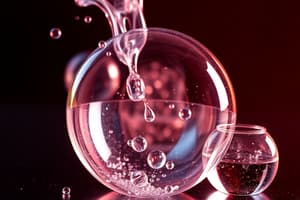Podcast
Questions and Answers
Into what two broad classes can all matter be divided?
Into what two broad classes can all matter be divided?
mixtures and pure substances
What is the difference between a mixture and a pure substance?
What is the difference between a mixture and a pure substance?
Mixtures can be separated by physical means; pure substances cannot be separated by physical means.
What is the difference between a compound and an element?
What is the difference between a compound and an element?
Compounds can be broken down by ordinary chemical means; elements cannot be broken down by ordinary chemical means.
Can a compound be a heterogeneous mixture?
Can a compound be a heterogeneous mixture?
Identify the following as a compound or an element: gold
Identify the following as a compound or an element: gold
Identify the following as a compound or an element: aluminum
Identify the following as a compound or an element: aluminum
Identify the following as a compound or an element: water
Identify the following as a compound or an element: water
Identify the following as a compound or an element: sugar
Identify the following as a compound or an element: sugar
Identify the following as a compound or an element: oxygen
Identify the following as a compound or an element: oxygen
Identify the following as a compound or an element: platinum
Identify the following as a compound or an element: platinum
Identify the following as a compound or an element: salt
Identify the following as a compound or an element: salt
Identify the following as a compound or an element: chlorine
Identify the following as a compound or an element: chlorine
Identify the following as a compound or an element: brass
Identify the following as a compound or an element: brass
How can you tell the difference between a homogeneous mixture and a heterogeneous mixture?
How can you tell the difference between a homogeneous mixture and a heterogeneous mixture?
Identify the following as either homogeneous or heterogeneous: air
Identify the following as either homogeneous or heterogeneous: air
Identify the following as either homogeneous or heterogeneous: clay
Identify the following as either homogeneous or heterogeneous: clay
Identify the following as either homogeneous or heterogeneous: homemade lemonade (with pulp)
Identify the following as either homogeneous or heterogeneous: homemade lemonade (with pulp)
Identify the following as either homogeneous or heterogeneous: oatmeal raisin cookies
Identify the following as either homogeneous or heterogeneous: oatmeal raisin cookies
Identify the following as either homogeneous or heterogeneous: finger paint
Identify the following as either homogeneous or heterogeneous: finger paint
Identify the following as either homogeneous or heterogeneous: vinegar
Identify the following as either homogeneous or heterogeneous: vinegar
Identify the following as either homogeneous or heterogeneous: soil
Identify the following as either homogeneous or heterogeneous: soil
List three methods that are commonly used to separate mixtures into their component substances.
List three methods that are commonly used to separate mixtures into their component substances.
Flashcards are hidden until you start studying
Study Notes
Types of Matter Overview
- Matter can be divided into two main categories: mixtures and pure substances.
- Mixtures are combinations of substances that can be separated by physical methods, while pure substances cannot be physically separated.
Compounds vs. Elements
- Compounds are substances formed from two or more elements and can be broken down by ordinary chemical means.
- Elements are the simplest form of substances and cannot be broken down by chemical means.
Mixtures
- A heterogeneous mixture has a non-uniform composition and can often be separated easily, whereas a homogeneous mixture has a uniform distribution and is more difficult to separate.
Categorization of Substances
- Gold, aluminum, oxygen, platinum, and chlorine are classified as elements.
- Water, sugar, salt, and brass are identified as compounds.
Characteristics of Mixtures
- Homogeneous mixtures appear uniform throughout; examples include air, clay, finger paint, and vinegar.
- Heterogeneous mixtures lack uniformity and include homemade lemonade with pulp, oatmeal raisin cookies, and soil.
Separation Techniques
- Common methods for separating mixtures include:
- Distillation: separates based on differing boiling points.
- Filtration: separates solids from liquids or gases using a filter.
- Crystallization: forms solid crystals from a solution as it evaporates.
Key Identifications
- Homogeneous: air, clay, finger paint, vinegar.
- Heterogeneous: homemade lemonade with pulp, oatmeal raisin cookies, soil.
Studying That Suits You
Use AI to generate personalized quizzes and flashcards to suit your learning preferences.




